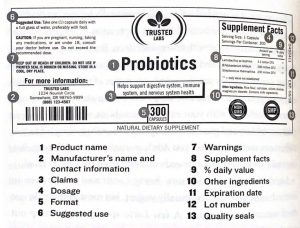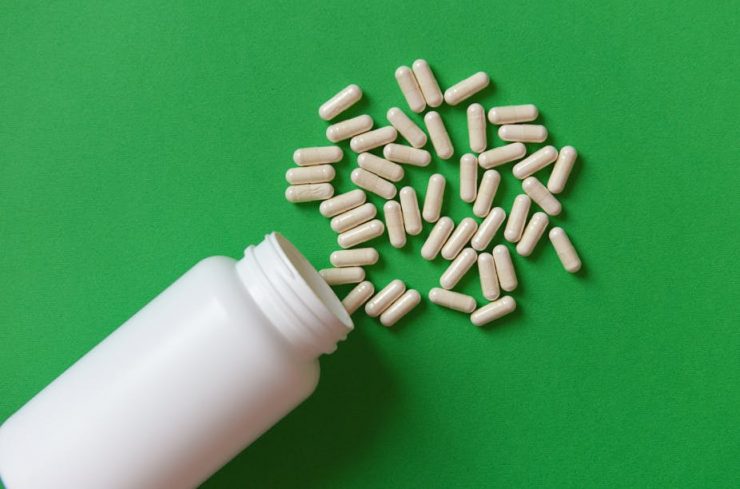So you’ve heard of this new food supplement that is supposed to do wonders for your body but you’ve no idea how or why it works or if some of these are even legit?
Using some reliable resources, I have compiled all I know about probiotics and here is my attempt to explain them in as little detail as possible to save you the research – hope it helps!
What are probiotics?
Probiotics are live microorganisms that live inside our gut that are associated with many health benefits. While the research is still evolving, there are plenty of studies done to suggest the importance of improving or restoring our gut microbiome balance. Connections between the gut and our brain (the gut axis) are the focus of some ground-breaking research into alleviating symptoms of depression and anxiety as well as supporting a healthy immune system. As well as this, the good bacterium of our microbiota produces important molecules that strengthen the gut barrier and can help balance blood sugar, lower blood fats, regulate appetite, facilitate communication with the brain which ultimately help prevent many diseases (eat yourself healthy).
Where do I find them?
Before I get into the pill form of probiotics, it is important to know that there are many natural probiotics found in the foods most of us eat on a daily basis. Natural yogurt is the best-known source of probiotics, whereby important bacteria species for our gut lacto and bifido multiply in milk to produce lactic acid that ferments the milk. Look for the label live on yogurt labels to ensure you are ingesting live bacteria when you eat them to get all the benefits! Other dairy products such as aged cheeses like parmesan are also a good source of probiotics. For those who are dairy free, do not fret – fermented foods such as kimchi and sauerkraut are other natural probiotics – a single cup of sauerkraut can contain 10 million CFU’s of Lacto and another species Leuconostoc.
Prebiotics
It is important to note that to maximise the benefits of these probiotics, you must give these bacteria the fuel to thrive. Prebiotics are the fiber that act as food for the probiotics – the more prebiotics you eat, the more diverse your microbiota will be. Increasing your fibre intake is the best possible way to ensure this – that means eating lots of fruit and veg and wholegrain unrefined carbs. Making conscious choices to include more fibre in your diet will amplify the health of your gut – and improve your mood.
Finding a probiotic supplement that suits you
In today’s world, where everyone is looking for a quick fix to be ‘healthier’ and ‘happier’ – there are plenty of probiotic products manufactured with vague claims of health benefits that are not entirely proven to be accurate and so it is important to know how to pick out the real deal among the sea of false advertising.
Know the label.

The first step in picking your probiotic is to understand the label. Here are the most important things to be aware of:
- Claims – it is important to look out for any false claims on a probiotic label, generally anything that claims to ‘cure’ or ‘prevent’ disease is unreliable as probiotics are supportive food supplements, not medication.
- Dosage – Microbes are tiny as so bear in mind that it will take billions of them to have an effect and they will need to be alive to work. Typically, a probiotic mix will have tens of billions of colony forming units (CFU’s) – the typical dosage unit. The higher the numbers the better due to the fact that fewer than a third of them will survive the journey through the chemical processes of your gut.
- Supplement facts – This is where you will find the microbial species used in the supplement. It is important to know the various types of bacteria and what they do before committing to buying – I go into this in detail here.
- Other ingredients – Pay attention to this if you have any allergies or religious/dietary preferences.
- Expiration date – Since probiotics are living organisms, they will die overtime and lose their effectiveness – so it is important to be aware of this and follow storage instructions carefully. Probiotics do not need to be kept refrigerated unless stated on the label.
- Quality seals – The only important quality seal is GMP – good manufacturing practices – which is an indication of cleanliness, proper management of sources of materials and employee training. If you’re choosing between two simple probiotics with no added prebiotics, where one is more expensive and labelled ‘Gmo free, Allergen free, vegan’, do not fall for it – you should not be paying more. Bacteria by nature are all of these things.
Know the bacteria and what they target.
Here are some (not all) of the most popular bacterial species that have been shown to benefit your gut and are commonly used in probiotic supplements. It is useful to know that these are all bifido and lacto species.
Bifidobacterium longum (R0175 & 1714) or Bifidobacterium infantis
Targets: Anxiety, Depression and IBS.
- B. longum can reduce anxiety and cortisol (stress hormone) levels and can improve coping skills in stressful situations.
- B. longum boosts the amount of available tryptophan, a precursor to serotonin which can have an antidepressant effect.
- Improves cognitive function – useful for healthy people who want to improve performance.
- Naturally found in yogurt, kefir and sauerkraut.
- B. infantis 35624 is a potent anti-inflammatory.
- Relieves symptoms of diarrhoea and constipation forms of IBS.
Lactobacillus acidophilus
Targets: Anxiety, Small intestinal bacterial overgrowth (SOBO)
- Found in yogurt, sauerkraut and kefir.
- Potent fighter against Campylobacter jejuni, a pathogen that causes gastroenteritis and anxiety – gives an antianxiety effect.
Lactobacillus rhamnosus
Targets: Depression, Anxiety, IBS
- Increases levels of neurotransmitter GABA – helps alleviate symptoms of depression and anxiety.
- Found in yogurt, Parmesan cheese, kefir, fermented sausage and fermented soy cheese.
- L. rhamnosus GG is one of the best studied strains shown to be effective in the treatment of IBS.
Lactobacillus casei
Targets: Anxiety
- Helps mitigate the inevitable damage of antibiotics on the microbiota.
- Patients suffering from chronic fatigue syndrome have shown less anxiety and better gut health after eating L. casei.
- Works well in the company of L. acidophilus.
The bottom line
While the ideal dosage in probiotics is still being established, there are many promising studies to prove that probiotics can be very useful in treating gut related issues as well as supporting an already healthy lifestyle. However, it is worth bearing in mind that majority of bifido and lacto species that benefit our gut can be found in many foods that you might already include in your weekly shop. If you are looking to target specific health issues with certain strains of bacteria, then it is worth considering buying a supplement to suit your needs but do so as part of a balanced diet with plenty of fibre for best results.
Tested Brands to trust
Activia
https://www.activia.us.com/probiotic-drinks/
Yakult
https://www.yakultusa.com/
Align
https://www.alignprobiotics.com/en-us/shop-probiotic-supplements/align-probiotic-supplement
Zenflore
https://www.precisionbiotics.com/ie/zenflore
Important warning: if you have a compromised immune system or IBD, probiotics might be problematic. Talk to your doctor before you try adding them to your diet.
References
- ANDERSON, S. C., CRYAN, J. F., & DINAN, T. G. (2017). The psychobiotic revolution: mood, food, and the new science of the gut-brain connection
- MAYER, E. A. (2016). The mind-gut connection: how the hidden conversation within our bodies impacts our mood, our choices, and our overall health.
- ROSSI. M. (2019). Eat yourself heathy.

